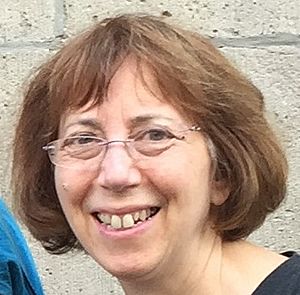Carolyn S. Gordon facts for kids
Quick facts for kids
Carolyn S. Gordon
|
|
|---|---|

Gordon in 2016
|
|
| Born | December 26, 1950 |
| Alma mater | Purdue University (BS) Washington University in St. Louis (PhD) |
| Known for | Inverse spectral problems, homogeneous spaces |
| Awards |
|
| Scientific career | |
| Fields | Mathematics |
| Institutions | Washington University Lehigh University Dartmouth College |
| Doctoral advisor | Edward Nathan Wilson |
Carolyn S. Gordon, born in 1950, is a brilliant American mathematician. She is a professor of mathematics at Dartmouth College. Dr. Gordon is famous for her work on a tricky question: "Can you hear the shape of a drum?" She worked with David Webb and Scott A. Wolpert to answer this. She has also won important awards, like the Chauvenet Prize. In 2010, she was honored as a Noether Lecturer.
Contents
Early Life and Schooling
Carolyn Gordon went to Purdue University and earned her first degree, a Bachelor of Science. She then continued her studies at Washington University in St. Louis. In 1979, she earned her PhD in mathematics. Her main teacher and guide for her PhD was Edward Nathan Wilson. Her special project was about isometry groups of homogeneous manifolds. These are complex math ideas about shapes and spaces.
After her PhD, she did more research at Technion – Israel Institute of Technology. She also worked at Lehigh University and again at Washington University in St. Louis.
Her Amazing Work in Mathematics
Dr. Gordon is best known for her work in a field called isospectral geometry. A famous question in this area is "Can you hear the shape of a drum?" This means, if you know all the sounds a drum can make, can you figure out its exact shape?
In 1966, a mathematician named Mark Kac asked this question. Another mathematician, John Milnor, found that some 16-dimensional shapes could sound the same but be different. But for flat, 2D shapes, the question was still a mystery.
Then, in 1992, Dr. Gordon, with her co-workers David Webb and Scott Wolpert, found the answer! They created two flat shapes that looked different but made the exact same sounds. You can see an example of these shapes in the picture. This showed that you cannot always hear the shape of a drum.
Later, Dr. Gordon and David Webb found more shapes that sounded the same but were different. They found these in other types of spaces too.
Dr. Gordon has written many articles about isospectral geometry. She has explored how shapes can have the same sounds but different topologies. Topology is a branch of math that studies shapes and spaces. These special shapes can be found using a method called the "Sunada method." In 1993, she found shapes that sounded the same but were not even locally the same. She has continued to find many more examples with other mathematicians.
She has also studied how these "same-sounding" shapes relate to their homology class and length spectrum. The length spectrum is about the lengths of all the closed paths on a shape.
Awards and Recognitions
In 2001, Carolyn Gordon and David Webb won the Mathematical Association of America Chauvenet Prize. They won it for their paper called "You can't hear the shape of a drum." This paper was published in American Scientist magazine.
In 1990, she received an AMS Centennial Fellowship from the American Mathematical Society. This award is for excellent early career research. In 1999, she gave a special talk at a joint meeting of the AMS and MAA. In 2010, she was chosen as a Noether Lecturer, which is a very high honor for women in mathematics.
In 2012, she became a fellow of the American Mathematical Society. She also became a fellow of the American Association for the Advancement of Science. From 2005 to 2007, she was a member of the AMS Council. In 2017, she was chosen as a fellow of the Association for Women in Mathematics. This was in the very first group of fellows for this association. She was also featured in the March 2018 edition of the AMS Notices, which celebrated Women's History Month.
Her Personal Life
Carolyn Gordon is married to David Webb, who is also a mathematician and her research partner. She has said that raising her daughter, Annalisa, is her greatest joy.
See also
 In Spanish: Carolyn S. Gordon para niños
In Spanish: Carolyn S. Gordon para niños


